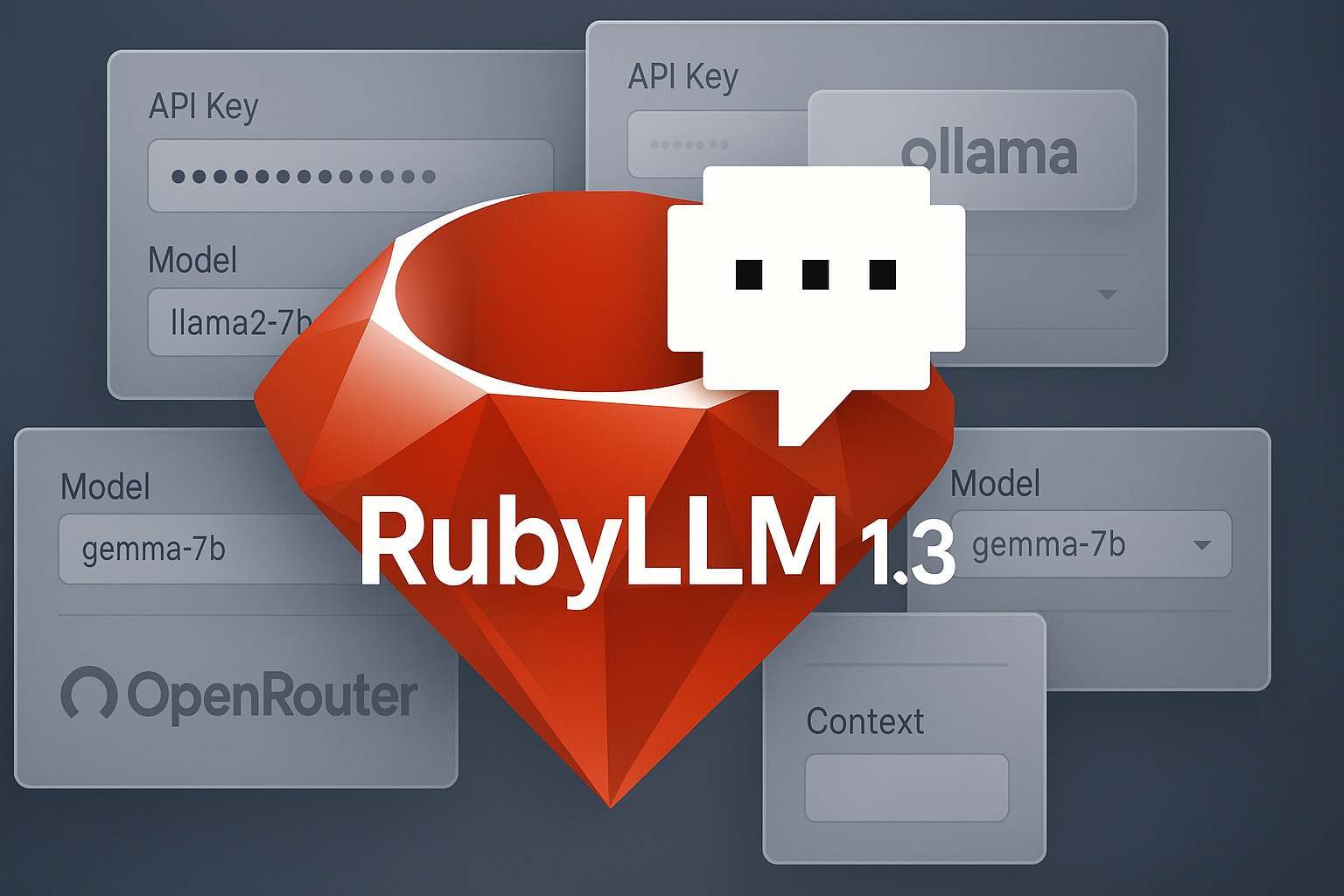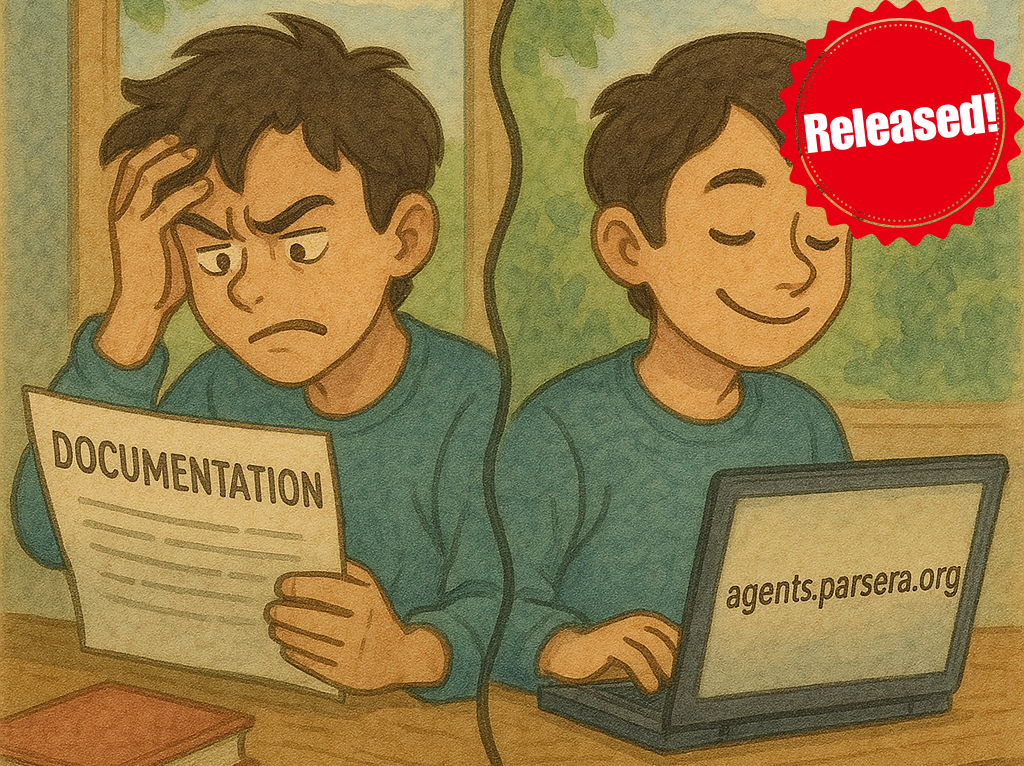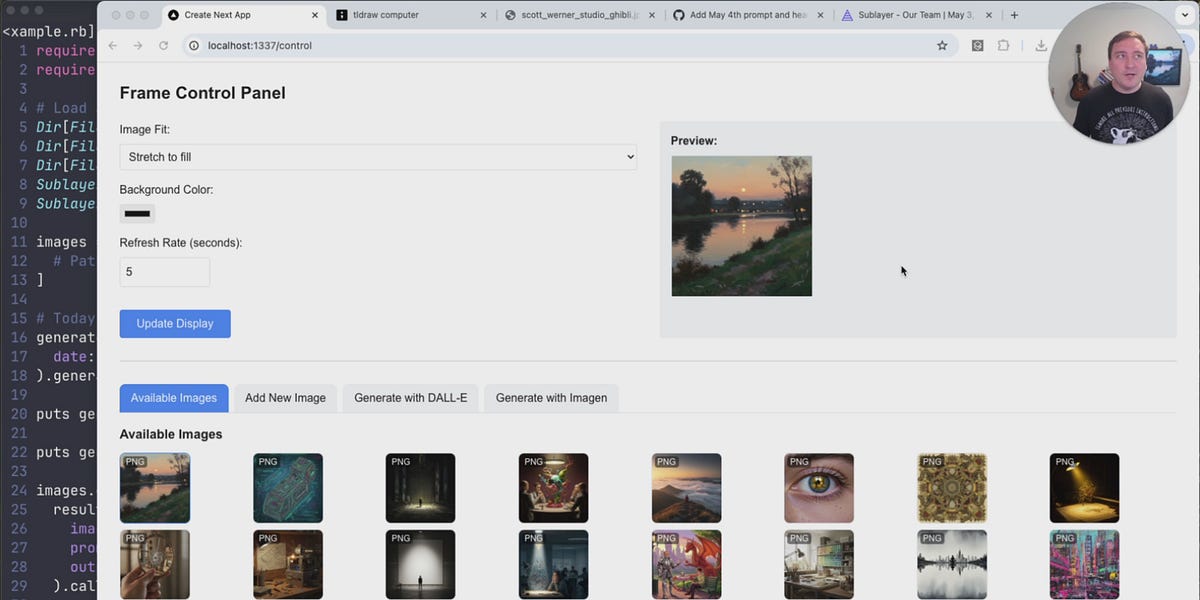- RoboRuby
- Posts
- Ruby AI News - May 16th, 2025
Ruby AI News - May 16th, 2025
Boom, roasted! with Shopify's new AI framework
Welcome to the 6th edition of the Ruby AI Newsletter! This edition features Shopify’s new open-source framework for building structured AI workflows, a flurry of new RubyLLM innovations, job opportunities specifically for AI agents, and much more.

Contents
Top Stories
Roast: Shopify’s new AI Framework
This week Shopify announced and open-sourced Roast, a Ruby framework for building structured AI workflows. Roast aims to streamline AI automations during the software development process with a number of powerful features. Workflows are defined with YAML configuration files, and prompts are written in ERB-enabled Markdown. The framework has a number of built-in tools and can be extended with custom Ruby scripts. Every workflow supports shared contexts, and each step can be configured with different LLM providers and parameters. Replaying sessions, parallel execution of steps, and function caching are all supported out of the box. But maybe the most powerful feature is the visibility into every aspect of the workflow via ActiveSupport::Notifications-powered instrumentation. Another amazing contribution to the Ruby ecosystem by the Shopify team and Obie Fernandez.
RubyLLM continues to innovate
RubyLLM’s 1.3.0 release is shaping up to be its biggest one yet. The new version introduces isolated configuration capabilities for multi-tenant applications, Ollama and OpenRouter support, and smart attachment functionality that can auto-detect file types. Already a leader in Rails integration, RubyLLM now deeply integrates with ActiveStorage by providing easier file attachment handling. This summary doesn’t do the update justice, but this X/Twitter thread by Askar Yusupov details the improvements much better than I could.
Additionally, RubyLLM intregrated Parsera, an API for LLM capability and pricing data, bringing all of the latest LLM metadata into your AI applications.
Jobs & Opportunities… for AI agents?
Looking for the next big thing? Firecrawl announced that they are spending one million dollars to hire AI agents - autonomous intelligent software that can sell, market, and code. The next major SaaS opportunity may very well be building AI employees that compete for positions at companies around the world. Code once, and get hired thousands of times!
I'm spending $1 million to hire AI agents for our startup @firecrawl_dev
The future belongs to those who can build and control armies of AI agents. We're hiring hundreds of them (and their creators) across our business.
See if your agent (or you) can make it.
— Caleb Peffer (Hiring!) (@CalebPeffer)
5:41 PM • May 9, 2025
Events
The San Francisco Ruby Meetup Group is gathering on May 21st for a talk by Obie Fernandez: Structured AI Workflows at Scale with Roast.
Toronto Ruby is meeting on May 27th and will feature a presentation by Andy Waite on Exploring the Ruby AI Ecosystem.
ArtificialRuby is taking a month off and hosting its next event in NYC on July 16th. A recap of the May 7th event will be posted when the presentation videos are available.
Abdelkader Boudih, author of the actionmcp gem, continues to drive specification-compliant adoption of the Model Context Protocol (MCP) in Ruby with two new articles. The first, If You Think MCP Is Just a Tool Registry, You’re Missing the Point, discusses how MCP is more than just a proxy for AI tools, it is structured autonomy with context-aware safeguards.
The second, Prompts in MCP: Preloaded Sanity, Not Just Fancy Slash Commands, demonstrates how MCP prompts are not simple templates, but server-defined, user-discoverable scripts designed to provide guardrails for autonomous AI agents and applications.
Ken Greeff published a follow up to Smarter Rails apps with AI using RubyLLM with Using AI Tools with RubyLLM.
Ed Izaguirre wrote Buidling AI Applications in Ruby. In this follow-up to Layers of the AI Stack, Explained Simply, he examines why Ruby is the better programming language for building web applications with AI integration.
José Valim launched Tidewave, speeding up software development with AI assistants integrated into your code editor via the model context protocol. Tidewave can run queries, review logs, and intelligently evaluate your code. Currently available for Phoenix and Ruby on Rails-powered applications.
Yorick Jacquin, the author of fast-mcp, is currently building the Ruby on Rails implementation for Tidewave.
Benjamin Houy launched LorelightAI, a service that provides continuous monitoring and intelligent alerts on how AI models perceive your brand. It it is built on top of Jumpstart Pro and uses cohere-ruby, pgvector, neighbor, and ruby-openai.
Alex Rudall made a brief announcement about the switch over of names from his anthrophic gem and Anthropic’s new Ruby gem.
PSA: @AnthropicAI are switching over the anthropic gem next week! If you're using my gem you need to update the name in your Gemfile to ruby-anthropic. #ruby#ai
— Alex Rudall (@alexrudall)
6:41 PM • May 14, 2025
Def Method claims to have hit a new milestone with Phoenix Everflame, suggesting that Phoenix can now generate a complete Rails test suite from start to finish without a single line of human-written test code.
Robert (0x1eef) released a new gem llm-shell, a command-line utility that can interact with multiple Large Language Models. In the launch announcment, there is a link to several demos that showcase how it works.
Scott Werner recorded Make Reviewing AI Output Fun! as part of his continuing experimental AI series “Works on my Machine”. The video and accompanying post look at making reviews of AI-generated content more enjoyable by introducing surprises, randomness, and simple automations.
Stanko Krtalic examined Adding MCP to a Rails app, documenting the experience of including an MCP server in a Rails application with the fast-mcp gem. The tutorial demonstrates the entire process and examines the key takeaways of Model Context Protocol, both good and bad.
DriftingRuby explored generating insights from product data using a self-hosted LLM in the video LLM Insights. It looks at analyzing purchase and shopping cart behavior and streaming actionable recommendations directly into the UI.
Thoughbot published a ton of new AI content since the last edition. Two videos on Rails and AI, the first, Building a Rails Feature with AI and ActiveJob:
The second, Using Github Copilot to help refactor Rails:
Along with three new general AI articles:
AI for Business: AI and cognitive engagement by Ferdia Kenny
AI for business: Evolution V revolution by Ferdia Kenny
AI-led or Human-led Coding? We have to choose by Sami Birnbaum
Fatih Kadir Akın released an MCP Startup Boilerplate for Rails featuring Devise, Doorkeeper, FastMCP, and Stripe and shared a demo on Reddit.
Duarte Martins introduced a sample repository with Rails instructions for Github Copilot in VS Code.
Chetan Mittal looks at What’s Next in AI That Can Be Built Using Ruby on Rails in 2025. The post examines ten example AI-powered application ideas and how Rails is ideally suited to build each one.
Every, an organization building with Ruby, presents the case that Google might win the race to be AI’s top backend provider with Vibe Check: Gemini 2.5 Pro and Gemini 2.5 Flash.
Avdi Grimm highlights the benefits of a junior developer over an AI agent with Agents aren’t Juniors, They are Amnesiac Spies.
Patrick Karsh, a Ruby on Rails developer, talks about Building My First Chrome Extension with Cursor AI. The discussion concludes that Cursor can be a powerful development partner, as long as you have carefully defined guardrails in place.
David Heinemeier Hansson weighed in on vibe coding with Coding should be a vibe! DHH feels that coding should be a joy and not a chore, and as such, does not want to give up writing code. However he sees AI as a collaborator that can provide help when you’re stuck.
CodeSignal released a new course on Building a ChatBot with OpenAI and Ruby. The course covers sending messages to LLMs, tweaking parameters, managing history, and personalizing system prompts by building an app on top of Sinatra.
Sahil Lavingia, the founder of Gumroad, suggests using deep research in ChatGPT to connect their open-source Ruby on Rails applications and gain comprehensive insights into the repositories.
Try it on our open source repos:
— Sahil Lavingia (@shl)
7:08 PM • May 8, 2025
Viget asked Can AI Replace UI Developers? The article comes to the conclusion that AI tools amplify human expertise, and that you should find a UI developer that can leverage AI tools effectively to get the maximum benefit.
Igor Kasyanchuk introduced his new gem get-smart, a collection of Rails’ tips generated from an LLM that display while starting the Rails server or console.
Trent Kocurek asked how to create embeddings locally in a Rails application and Steve Erickson suggested Andrew Kane’s informer’s gem.
Heroku announced tooling to Build and Deploy Enterprise Grade MCP Servers. According to Yehuda Katz, this new functionality allows you to just as easily use an AI model in your app as it would be to connect an addon, and then to extend the model’s behavior with custom code integrated via the Model Context Protocol.
Open Source Updates
Code Spotlight
Recently an article has been circulating that demonstrates the simplicity of building an AI agent, Thorsten Ball’s How to Build an Agent or: The Emperor Has No Clothes. While the code is written in Go, a couple of Rubyist’s have taken it upon themselves to translate this example into Ruby.
Radan Skorić did so with a tutorial on how to build a Coding agent in 94 lines of Ruby. The source code is also available on Github.
Glenn Ericksen also showcased another version on how to build an agent in Ruby, and open-sourced the respository on Github.
Sharing this project I built to learn more about AI Agents "How to Build an Agent". At its core, an agent looks like a REPL + LLM. Recommend reading Thurston's original post for a fuller description.
— Glenn Ericksen (@glennericksen)
4:58 PM • May 10, 2025
New Versions
Links to release notes or changelog if available.
ruby_llm 1.3.0rc1 - One interface for LLM compatible APIs.
activeagent 0.3.3 - Rails AI framework where agents are controllers and features use MVC conventions.
llm.rb 0.7.2 - Lightweight library that provides a common interface and set of functionality for multple Large Language Models.
actionmcp 0.50.11 - Tooling for building Model Context Protocol capable servers in Ruby on Rails applications.
ruby-mcp-client 0.5.3 - Integrate Model Context Protocol (MCP) servers to access and invoke tools from AI assistants.
plasma-mcp 0.0.2.pre.5 - Rails-inspired, convention-over-configuration approach to building Model Context Protocol servers.
vector_mcp 0.1.0 - Server-side tools for implementing the Model Context Protocol in Ruby applications.
prompt_manager 0.5.3 - Provides a simple way to manage prompts for a generative AI system.
aia 0.9.0 - CLI for generative AI workflows, offering prompt management, shell and Ruby integration, interactive chat, and advanced automation.
llmclt 1.0.2 - Simple client for the Gemini API.
kagi-api 0.1.0 - A Kagi API client for privacy focused information.
New Gems
Links to RubyGems page.
roast-ai - Rub structured AI workflows along with the building blocks for creating and executing them.
llm-shell - Command-line console that can interact with multiple Large Language Models.
rails_rules - Create and manage rules files for AI tooling.
ruby-kuzu - Ruby binding for the Kùzu embedded graph database.
agora-ruby - Interact with Agora.io's RESTful services, focusing on cloud recording functionalities.
levo_rails_middleware - Rails middleware for that captures HTTP requests and responses and sends them to Levo.ai for API security analysis.
askcii - Terminal-friendly interface for interacting with LLM models.
pocketflow - Minimalist LLM framework.
prreview - Collects PR data from GitHub to format as XML and paste into any LLM and get helpful code reviews.
get-smart - LLM powered Ruby and Rails tips in your console.
Jobs & Opportunities… for humans
If you need help finding the right development role, please reach out and let me know the type of opportunity you’re pursuing.
Remote
Hybrid
NYC / Toronto: Medsender - Software Engineer | Developer API
NYC / Toronto: Medsender - Senior Software Engineer
Onsite
Cleo AI currently has over 15 Ruby career opportunities available in London and Poland, including Director of AI, Engineering Manager, Technical Lead, and Growth / Product / Staff / QA / Web / Mid & Senior level engineering positions. See more on their career page.
Los Angeles: Realm Living - Senior Full Stack Engineer
Los Angeles: Realm Living - Full Stack Engineer
Mountain View / NYC: JKV International (Recruiter) - Ruby on Rails Developer
Brazil: CloudWalk - Engineer - Ruby
Germany: Instaffo - Lead Ruby on Rails Developer
Germany: Instaffo - Senior Ruby on Rails Developer
That’s all for this edition! Be sure to reach out if you have any stories, content, jobs, or events you want featured in the newsletter.
















